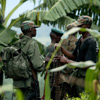
In a New York Times opinion piece former Assistant Secretary of State for African Affairs Herman J. Cohen proposes a solution to the economic dimension of the conflict in eastern Congo: a common market that would allow Congo’s neighbors to continue to profit from the trade in its natural resources, but with tax revenues accruing to the Congolese government. It’s a promising thought, but in the midst of ever-heightening regional tensions, would President Kabila of Congo or President Kagame of Rwanda really sign on to something like this? Oh wait, they sort of already did.
In 2006, 11 regional heads of state signed on to a legal document known as the Pact of Security, Stability and Development in the Great Lakes Region, which among many other things, committed them to “undertake to jointly promote a prosperous, integrated economic space.” Little progress has been made on these issues, in part because international actors haven’t held Kabila, Kagame and other regional leaders to their commitments. Regional initiatives like the Great Lakes Pact tend to be dismissed as mere confidence building measures with little prospect for effective implementation, further fueling the cycle of cynicism and instability in the region.
Although a regional common market may be years, if not decades, down the road, cooperation through the Great Lakes Pact could facilitate immediate steps to undercut the incentives driving a booming smuggling trade in minerals. Harmonizing export regimes would be a start: as long as the cost of legally exporting minerals from Congo is vastly more expensive than the cost of exporting the same goods out of Rwanda, smuggling will continue to thrive.

